Embarking on the pursuit of a science degree, specifically in marine biology or environmental science, without any prior scientific background knowledge might seem like a daunting task. However, it is indeed a feasible endeavor.

This article aims to shed light on how individuals can turn this aspiration into a reality.
The K12 Foundation: How Lack of Prior Knowledge Affects the Start
During the K12 education phase, a lack of in-depth science exposure can make the initial step into a science degree program challenging. Many students who didn’t have a strong foundation in scientific concepts such as biology, chemistry, and physics might feel overwhelmed at the thought of diving into marine biology or environmental science. For example, understanding the basic principles of ecological systems, which are fundamental in environmental science, requires some prior knowledge of biological and physical processes. However, this doesn’t mean it’s an insurmountable obstacle. As stated on Britannica’s education page, education is a continuous process, and starting late doesn’t equate to failure.

University Curriculum: A Stepping Stone for the Uninitiated
University degree programs in marine biology and environmental science are designed to be inclusive. They often start with introductory courses that serve as a bridge for students with little to no prior knowledge. These courses cover the basics, from the structure of cells in marine organisms to the principles of environmental conservation. For instance, general biology courses will introduce students to the building blocks of life, which are crucial for understanding the complex ecosystems in marine biology. Additionally, universities provide support systems such as tutoring services and study groups. According to Wikipedia’s page on marine biology education, many institutions recognize the diverse backgrounds of their students and strive to make the learning experience accessible.
Success stories abound of individuals who started with no scientific background and went on to excel in these fields. Take, for example, some students who were initially drawn to marine biology due to their love for the ocean. Despite having no prior scientific training, they dedicated themselves to learning, attending extra study sessions, and participating in research projects. Their passion and hard work led them to achieve remarkable results in their academic pursuits.
Readability guidance: As we can see, the journey from having no prior scientific knowledge to obtaining a science degree in marine biology or environmental science is filled with opportunities. With a solid understanding of the starting challenges, the supportive nature of university curricula, and inspiration from success stories, anyone with a passion for these fields can take the first step. However, it’s important to approach this journey with dedication and a willingness to learn.


